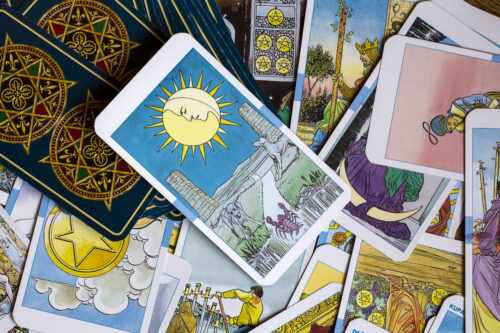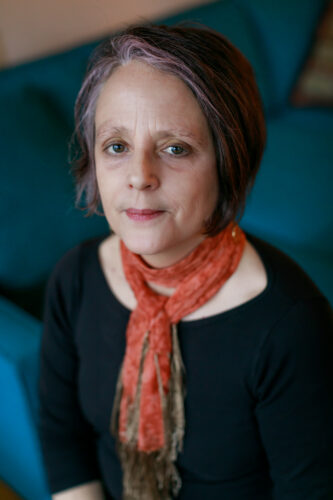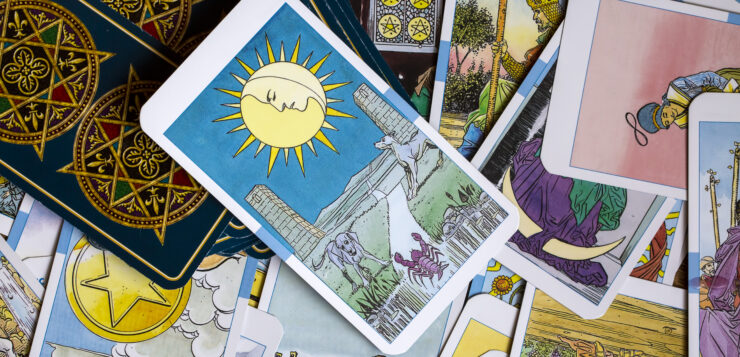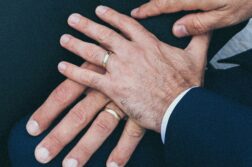
In my novel The Good War, one of the characters, Charlotte Galle, stands naked in front of a mirror and asks herself if what she sees is a lesbian body. When I was in my late thirties, I asked myself the same question while standing in front of a mirror in my apartment in San Francisco. I was wracked with desire for a younger woman I worked with, and I was married to a man I had been with for more than a decade.
I had been attracted to women before but, though it pains me to admit it, I had never acted on those feelings. I went to a women’s college in New York City and lived for a time in Provincetown, and more than once I had been thought to be gay by others. Somehow my head, with its labyrinth of repressions, had overruled my body for decades.
But when I met that bright young thing, I experienced a profound reversal in the order of my being. My heart, my gut, my cunt assumed positions of power. If that moment was a tarot card it was absolutely The Tower — the first time I spoke to her I felt hit by lightning. The rules of my gravity changed.
At the time, my marriage was in deep disrepair. My husband and I were more interested in experimental art and music than in practical matters. We smoked far too much weed to be clear eyed about plans for the future, and we shared a debilitating cynicism about life. I won’t deny we had fun — we were in an art collective that made a zine and a cable access TV show, we went to the Faust Fest in Germany and saw many great performances — Ornette Coleman, Diamanda Galas, and Acid Mothers Temple come to mind — but I was unhappy. For years he had been working for a badly managed recording studio that did not pay him on time. I held an administrative job at a university that provided us with healthcare and allowed me to pursue an MFA in writing while working full time. He spent a lot of time on Facebook. When I tried to have conversations about budgets or about taking a break from the weed, he went out for drinks and a show.
My body then sent me a message that things were not all right. I had a reproductive health crisis that included life-threatening blood loss and a cancer scare. I engaged in a long process of bodily exploration. I had already been practicing yoga for years, and I tried all the tools I could muster to address the trouble, but finally turned to surgery to remove my uterus. I’d never wanted children, but it was still a big deal. Yet it was a time of discovery and reckoning. I had to take more time off work than I had sick time to cover. My husband was a good cook — he left bowls of oatmeal with molasses and berries for me before he went to work, and cooked iron-rich dinners of greens and lamb chops — but he was not being paid regularly. We ran aground financially and I realized something I had deluded myself about for years: that I was the one who had been keeping us afloat. I had had a fantasy, particularly when I thought I would need treatment for cancer, that he would step up and support us. I realized then that he never would.
After I recovered, I changed jobs, going to work for an organization that provided philanthropic and back-end support for progressive nonprofits. There I met the young woman who would change my life. In her late twenties, she was gorgeous and irreverent and passionate about queer visibility and prison reform. My desire for her was immediate, overwhelming, and physically painful. Her energy and ambition made a stark contrast to my husband’s stubborn refusal to change. I ached for her. It turns out that I was, and am, a lesbian. Suddenly I was the heroine of a soap opera. Taboos abounded — a workplace romance between two people who were both coupled began to unfold. She and I left our respective partners and were together for about five years. The timeline is blurry, particularly because my tendency is monogamy, while she is avowedly polyamorous. Being intimate with more than one person, which I tried for a brief time with her and my husband, was not something I could sustain. And truly, it wasn’t fair to him, just as our marriage was not fair to me. She helped me leave him, which was part of the greatest gift she gave me: she handed me a mirror to my own desire.
I never went back to living as a heterosexual. I like to believe that my current partner and I will go the distance. She is a self-made person who has built a good life through hard work: a woodworker, a sailor, and a sweet soul. I hope we’ll keep sharing our lesbian bodies and lives.
When we were splitting up, my then-husband reminded me that I had said to him, early in our time together, that I ever left him it would be for a woman. One of the people who interviewed me for that life-changing job, who became a friend, said that she and several others in that organization had assumed I was gay. That moment in my life was not the first time I’d been read that way, but it was the moment when circumstances aligned so that I could receive that bolt from the blue and get my head right with my heart.
 Elizabeth Costello is a writer living in Portland, Oregon. She works (remotely) as an editor for UC Berkeley and co-founded the ekphraestival, a generative exchange among visual artists and poets that culminates in readings and exhibitions in April, national poetry month. Her publications include arts writing forSF Weekly and 7×7 and the poetry chapbook RELIC. Her debut novel, The Good War, is forthcoming in January from Regal House.
Elizabeth Costello is a writer living in Portland, Oregon. She works (remotely) as an editor for UC Berkeley and co-founded the ekphraestival, a generative exchange among visual artists and poets that culminates in readings and exhibitions in April, national poetry month. Her publications include arts writing forSF Weekly and 7×7 and the poetry chapbook RELIC. Her debut novel, The Good War, is forthcoming in January from Regal House.






